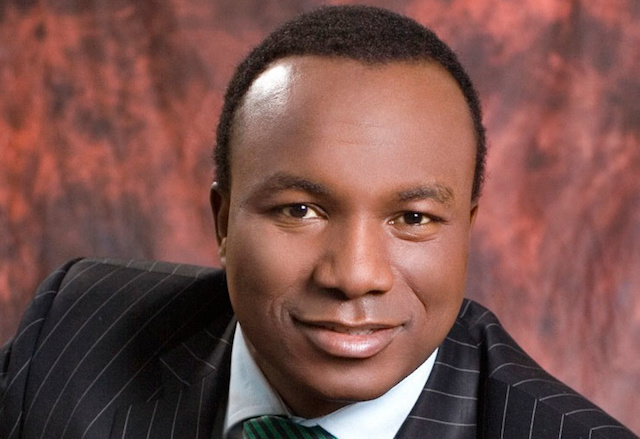Is leadership really Africa's main problem? (1), by Sunday Adelaja

…when it comes to building a nation, although leadership is important, but it is not of paramount importance. The role of leadership can be more important when dealing with businesses, companies or smaller units like family, communities, associations, industries etc.
In addressing this topic of leadership, I will use my country, Nigeria, as a case study for several reasons: (1) Because it is where I come from and I know it better than any other country . ; (2.) Nigeria is the most populous country in Africa, so whatever affects Nigeria affects all of Africa; (3) It has become a "proverb" around the world how bad leadership ruins Nigeria.
Ever since I was a young teenager growing up in Africa, I kept hearing it continually, almost like a mantra, "that our only problem in Nigeria is leadership" or "that our biggest problem in Nigeria is leadership" etc.< /p>
Books have been written on this subject, seminars are endless on this subject, symposia, colloquiums, all kinds of platforms and avenues where various experts, teachers, writers, professors, have tried to foster solutions to this persistent problem of leadership in Nigeria and Africa.
For the man in the street, however, who does not go to these symposia and seminars, there is only hope left. I hope one day a kind and lovely leader will rise up who will build a wonderful nation for them, where everyone will be happy and satisfied. For this hope the ordinary man prays in his church, his mosque and even in the secrecy of his home.
It is this hope that drives him to line up in all weathers, hoping to vote. For the hope of this supposedly great and kind leader. Paradoxical as it may seem, this hope has even led some naive and zealous men to stage a number of coups throughout Africa in the hope that just in case this great and good leader who would build the paradise of their dreams. for them.
The only problem with this kind of mentality is that it has been almost 55 years now that Nigeria and Africa have been hoping and still hoping for a good and kind leader who would lead our nation and our continent to the Promised Land. If we applied the principle of critical thinking, we would see that either what we pray and hope is wrong, or something is wrong with our nation and our continent.
Hypothetically, if this hope and prayers had been correct, there should have been at least a few countries in Africa that should have got it right, especially since the period we are talking about is not five or 10 years, but 55 years. It's a lot of time. There should have been many opportunities for at least some African countries to have produced great leaders, who would have built prosperous and great nations.
…having lived outside Nigeria for the past 30 years, working with politicians, countries, governments, being a student of national transformation, and a consultant and expert in nation building, national transformation and in factors of development and civilization, I am now thinking differently.
The fact that this same problem seems to be plaguing more than 50 African countries is not in itself a coincidence. Without device...


…when it comes to building a nation, although leadership is important, but it is not of paramount importance. The role of leadership can be more important when dealing with businesses, companies or smaller units like family, communities, associations, industries etc.
In addressing this topic of leadership, I will use my country, Nigeria, as a case study for several reasons: (1) Because it is where I come from and I know it better than any other country . ; (2.) Nigeria is the most populous country in Africa, so whatever affects Nigeria affects all of Africa; (3) It has become a "proverb" around the world how bad leadership ruins Nigeria.
Ever since I was a young teenager growing up in Africa, I kept hearing it continually, almost like a mantra, "that our only problem in Nigeria is leadership" or "that our biggest problem in Nigeria is leadership" etc.< /p>
Books have been written on this subject, seminars are endless on this subject, symposia, colloquiums, all kinds of platforms and avenues where various experts, teachers, writers, professors, have tried to foster solutions to this persistent problem of leadership in Nigeria and Africa.
For the man in the street, however, who does not go to these symposia and seminars, there is only hope left. I hope one day a kind and lovely leader will rise up who will build a wonderful nation for them, where everyone will be happy and satisfied. For this hope the ordinary man prays in his church, his mosque and even in the secrecy of his home.
It is this hope that drives him to line up in all weathers, hoping to vote. For the hope of this supposedly great and kind leader. Paradoxical as it may seem, this hope has even led some naive and zealous men to stage a number of coups throughout Africa in the hope that just in case this great and good leader who would build the paradise of their dreams. for them.
The only problem with this kind of mentality is that it has been almost 55 years now that Nigeria and Africa have been hoping and still hoping for a good and kind leader who would lead our nation and our continent to the Promised Land. If we applied the principle of critical thinking, we would see that either what we pray and hope is wrong, or something is wrong with our nation and our continent.
Hypothetically, if this hope and prayers had been correct, there should have been at least a few countries in Africa that should have got it right, especially since the period we are talking about is not five or 10 years, but 55 years. It's a lot of time. There should have been many opportunities for at least some African countries to have produced great leaders, who would have built prosperous and great nations.
…having lived outside Nigeria for the past 30 years, working with politicians, countries, governments, being a student of national transformation, and a consultant and expert in nation building, national transformation and in factors of development and civilization, I am now thinking differently.
The fact that this same problem seems to be plaguing more than 50 African countries is not in itself a coincidence. Without device...
What's Your Reaction?






















